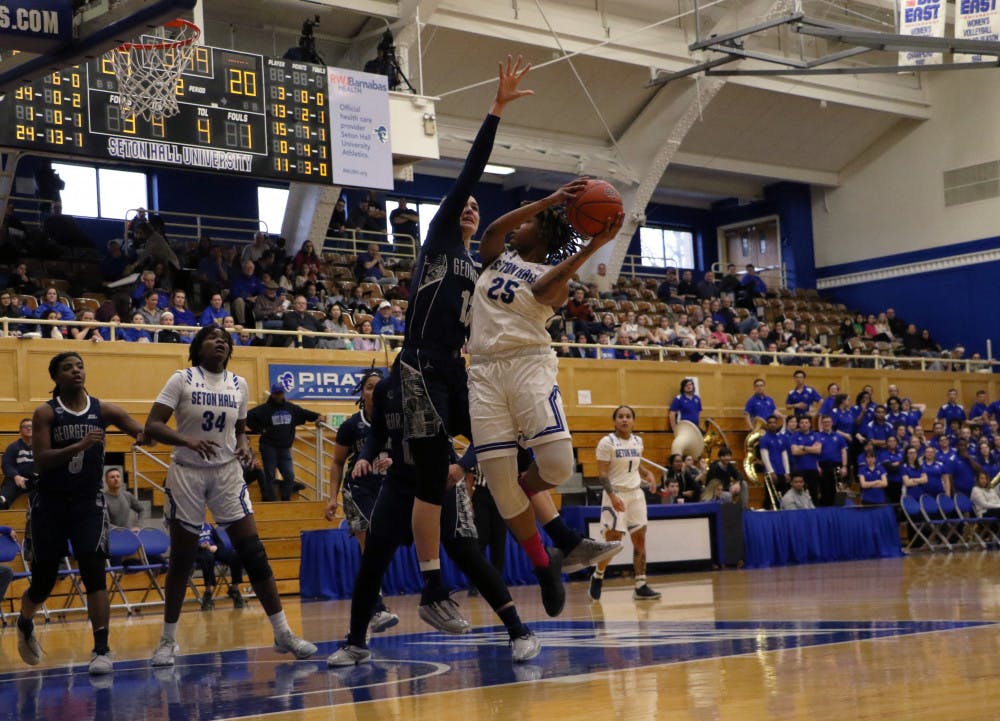
Montgomeryadvertiser.com
All Daisha Simmons wants to do is come home and play her final season of collegiate basketball closer to her family. She might finally be able to do just that.
On Tuesday Oct. 7, Simmons’ former school, the University of Alabama, finally announced support for Simmons to play this upcoming season, after months of refusing to release her scholarship, making her ineligible to play at Seton Hall this season.
Now the ball is completely in the NCAA’s court. The NCAA must decide now whether or not to grant Simmons eligibility for the 2014-15 campaign.
ESPN college basketball analyst and lawyer Jay Bilas said the Simmons case completely goes against what the NCAA is claiming in terms of student athlete welfare.
“For me, it goes to more of a rhetoric of the NCAA and all of its member institutions saying these are students first who just happen to be athletes and should be treated like any other students,” Bilas said. “If they truly are unpaid amateurs, they should not have what is the equivalent of a non-compete provision enforced against them.”
Non-compete provisions, according to Bilas, are for paid employees, something Simmons is not.
“If they’re [student athletes] are to be treated like every other student and unpaid amateurs, there is no justifiable reason to restrict her from going where she wants to go and from playing right away.”
Last May, Alabama released four of Simmons’ teammates after they were considered not good enough, sparking Simmons’ thought process of where to attend graduate school. It was then that Simmons’ decided to weigh out her options with her mother Christena Simmons. Simmons’ brother, who is on dialysis and needs a kidney transplant was also a major factor in Daisha’s decision to come home.
Simmons returned to Alabama in late May to inform the coaching staff of her decision to transfer.
“One of the assistant coaches asked me what I need a master’s degree for,” Simmons said. “She said 'it doesn’t matter what you get, I have one and I don’t use it.' I just sat there and in the back of my head I kept saying I’m going to do this because this is something I want to do.”
Simmons was given excuse after excuse during that meeting in May.
According to Simmons, she was told she could not transfer for she had already transferred in the past. She was also told she did not meet the requirements but could do other master’s degree programs at the University.
None of this was as enticing for Simmons as coming home to be with her family.
“It means a lot to be able to play in front of my family, especially my mom,” Simmons said. “I don’t know where I’m going to end up after this year, so there’s no telling if she’s ever going to be able to watch me play again. So just being able to have that on top of being able to help out, it just means a lot.”

ESPN.com
The University of Alabama claimed Simmons left the University with insufficient time with her transfer decision, however, there is no timeline an athlete must follow in terms of informing his or her university about a transfer decision. According to Bilas and Seton Hall women's coach Tony Bozzella, athletes can decide to transfer for whatever reason they want, with no grace period to inform the University of their decision.
“They used the word timing, but is there ever a right time,” women’s basketball head coach Bozzella asked.
“Just being there with a year you kind of learn how people are, and I know it’s a punishment,” Simmons said. “It doesn’t matter if I told them in the beginning of September or January or whenever, they were going to try to figure out a way to do this.”
Bilas also questioned the University of Alabama’s motives behind the decision.
“What are they doing, trying to punish her?” Bilas asked. “That doesn’t help them replace her. Are they trying to use this as a deterrent for all future people who may want to transfer or may want to go to school there that they may want to think twice should they have the audacity to want to move closer to home after completing a season? That’s laughable.”
Bozzella, a coach himself, did express an understanding behind Alabama’s motives.
“It’s frustrating because I understand Alabama’s point. They’re trying to protect their program, their associate athletic director is trying to protect his head coach, and she’s (Kristy Curry) is trying to protect her program,” Bozzella said. “But in the end, she understood it and like her husband told me, it’s water under the bridge, it’s time to move on.”
Not only did Simmons complete a season, she finished her undergraduate collegiate career. She completed what was asked of her.
After Alabama seemed they would be remaining persistent in the battle against Simmons playing this season, Simmons hired an attorney, Don Jackson, to take the matter to the legal system. Jackson threatened Alabama, and filed a Title IX suit against the school.
“They got a lot pressure,” Bilas said. “And I don’t think it was just media pressure, they got a lot of pressure from within the NCAA. I think the work that Don Jackson did was invaluable; the Title IX lawsuit and all of those things combined together made them (Alabama) realize it’s not worth the petty stance they were taking. That lawsuit is no joke; that can delve into the program how players are treated.”
Alabama eventually caved, and after Tuesday, there was only one thing standing in her way from playing in graduate school now.
The NCAA.
But just because Alabama supported Simmons’ eligibility does not mean those legal issues against them are not still in play.
The confusing aspect of the situation, for Bilas, is how quiet NCAA administrators have been in the aftermath of the University of Alabama’s decision.
“I can’t understand why so few NCAA administrators, who spend so much time talking about student athlete welfare, are so conspicuously silent on this matter,” Bilas said. “If someone talks about compensating a student athlete, everyone will shoot in with their opinion on how wrong that is. You’ve got a female non-revenue athlete who is being treated this way and it’s met by crickets. I can’t imagine staying silent on that.”

Jay Bilas
Bilas went on to say he anticipates Simmons being granted eligibility by the NCAA immediately, calling it a “formality.”
One can imagine this being a stressful time for a 23-year-old, especially given the circumstances Simmons is facing with her mother working two jobs and her brother being sick. Her former high school basketball coach at Gill St. Bernards, Mergin Sina, said he reached out to Simmons to offer support throughout the situation.
“I wanted to make sure she was going to class and keeping her head right and continuing to do the things that this kid did in terms of on the basketball court and academically,” Sina said.
Simmons’ situation sparks resemblance to Leticia Romero's transfer from Kansas State University back in May. Romero, who played her freshman year at Kansas State and was the team’s top scorer, wished to transfer from the University in March after athletic director John Currie fired the entire coaching staff. According to Bilas, Kansas State was ultimately forced to let Romero go after a long series of outcries from the media and the public.
The irony of the whole situation?
University of Alabama’s junior quarterback Jacob Coker was immediately eligible to play for the Crimson Tide this season after transferring from Florida State University.
So in terms of student athlete welfare, is there such a thing? Or is it just prioritized according to sport by revenue? It is time for the NCAA to answer.
“I think at this point, it’s time for everyone to step back and do what is right for the student athlete,” Bozzella said.
David Heim can be reached at david.heim@student.shu.edu or on twitter @davidheim12.





